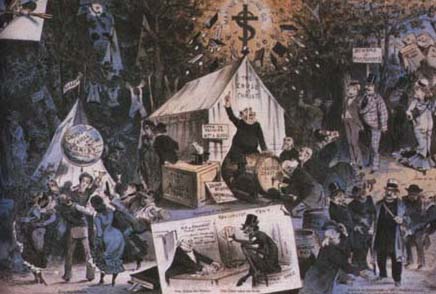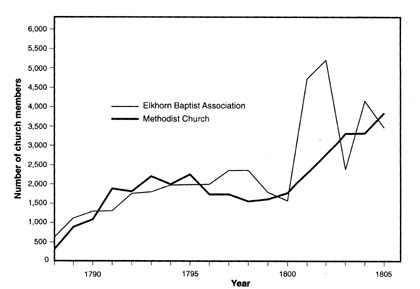The BEAST from the EARTH exerciseth all the POWER of the first BEAST before him,
Theater - Music in Religion: Jeff Walling, George Whitefield
and causeth the earth and them which dwell therein
to worship the first BEAST, whose deadly wound was healed. Rev. 13:12
CONTRARY AND ANTITHETICAL to the worship of God, THE WORSHIP OF THE BEAST is--
Thera^p-euō II. do service to the gods, athanatous, theous th., Hes.Op.135, Hdt.2.37, X.Mem.1.4.13, etc.; daimona Pi.P.3.109; Dionuson, Mousas, E.Ba.82 (lyr.), IT1105(lyr.); th. Phoibou [Apollon] naous serve them, Id.Ion111 (anap.): abs., worship, Lys.6.51; do service or honour to one's parents, E.Ion183 (lyr.), Pl.R.467a, Men.91a; serve, wait upon a master, Id.Euthphr.13d, cf. Ar.Eq.59, 1261, etc.; th. tas thēkas reverence men's graves, Pl.R.469a.
APOLLYON- Phoebus , i, m., = Phoibos (the radiant), I. a poetical appellation of Apollon as the god of light: quae mihi Phoebus Apollon, Val. Fl. 1, 228: Circe, [CHURCH AS WORSHIP CENTER] daughter of Sol, Petr. 135.
Phoebus , i, m., = Phoibos (the radiant), I.a poetical appellation of Apollo as the god of light: quae mihi Phoebus Apollo, Val. Fl. 1, 228: Circe, daughter of Sol, Petr. 135.B. Phoe-bēus , a, um, adj., Phbean, Apollinean: carmina, Lucr. 2, 504: lampas, the sun, Verg. A. 4, 6: virgo, Daphne, Ov. P. 2, 2, 82: laurus, id. Tr. 4, 2, 51: Rhodos, where the worship of Apollo prevailed, id. M. 7, 365: lyra, id. H. 16, 180: sortes, oracle, id. M. 3, 130: tripodes, id. A. A. 3, 789: Phoebeā morbos pellere arte, id. F. 3, 827.Female Worship Leater C. Phoebas , ădis, f., a PRIESTESS of Apollo; hence the inspired one, the PROPHETESS Ov. Am. 2, 8, 12; id. Tr. 2, 400; Luc. 5, 128; 165.
-therap-ōn henchman, attendant [1] Mousaōn [2] therapontes
[1] Mousa music, song [3 below] stu^ger-os , Mousa kanakhan . theias antiluron mousas
II. mousa, as Appellat., music, song, m. stugera A.Eu.308
Muses as: moisan pherein LADED BURDEN
Muses as: adokim-os , disreputable, discredited, reprobate,
Muses as: kanakhan . . theias antiluron mousas
clanging and harp-players
"This valley was early selected as the seat of the worship of Moloch, where his rites were celebrated by erecting a huge brazen image with a hollow trunk and arms, which was heated, and within which, or on the arms of which, children were placed as a sacrifice to the horrid idol. To drown their cries, drums were beaten, which were called Tophim." (Barnes, Isaiah 33, p. 463). Tabret and Topheth has the same root meaning.
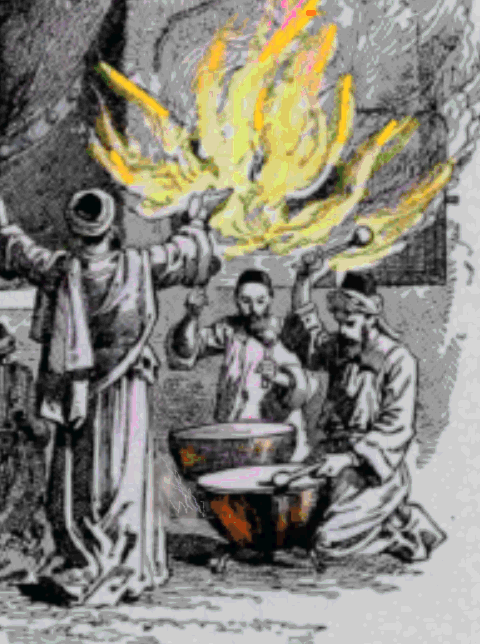
SPIRIT is never a god or person. Spirit is figurative or a parable which means--to disciples--that God always puts His WORD into the MOUTH of the Prophets. For the LAST TIME God put His Word into the mouth of Jesus of Nazareth. Jesus certified or made the prophecies "Concerning Me" perfect. Peter denied that anyone has the right to private interpret or Further Expound what the inspired writers left for our memory.
And his breath [SPIRIT], as rushing water in a valley, reach reach as far as the neck, and be divided,
to confound the nations for their vain error;
error also shall pursue them and overtake them. Isaiah 30:28 LXX
Must ye always rejoice, and go into my holy places continually,
as they that keep
a feast?
and must ye go with
a PIPE, as those that rejoice into
the mountain of the Lord,
to the God of Israel
Isaiah 30:29 LX
And it shall
happen to him from every side, that they from whom their
hope of assistance was, in which he trusted,
themselves shall war
against him in
turn with DRUMS and with HARP. Isaiah 30:32 LXX
For Tophet is ordained of old; yea, for the king it is
prepared; he hath made it deep and large:
the pile thereof is
fire and much wood;
the BREATH
[Spirit] of the LORD, like a stream of
brimstone, doth KINDLE it. Is. 30:33
Jeff Walling and George Whitefield knew that by using the artifices of mimesis and comedy they pointed out and defused their opponents' anxieties about music, theater, and sexuality, creating a space for players in the cultural mainstream."
SCRIPTURE AND RECORDED HISTORY CALLS IT SORCERY:
Plato,
Euthydemus
[289d] On
what proof do you rely? I asked.
I see, he said, certain
speech-writers who do not know how to use
the special arguments
composed by themselves,
just as lyre-makers in
regard to their lyres:
in the former case also there are other persons
able to use what the
makers produced,
Hence it is clear that in speech likewise there are two
distinct ARTS one of making and one of using.
I think you give sufficient
proof,
I said, that this art
of the speech-writers cannot be that whose
acquisition would make one happy.
And yet I fancied that somewhere about this point would
appear the knowledge which we have been seeking all this
while.
impress me as prodigiously clever,
Cleinias, but their art itself seems so exalted as to be almost inspired.
However, this is not surprising;
for it is a part of the SORCERER'S art, epōdōn tekhnēs
Latin 289e:
kai mentoi ouden thaumaston: esti gar tēs tōn epōdōn tekhnēs morion mikrō te ekeinēs hupodeestera.
Thaumaston Is a Lying wonder which claims that your rituals are ordained by God.
-epōdē , Ion. and poet. epa^oidē , hē, A.song sung to or over: hence, enchantment, spell, LADEN BURDEN
ou pros iatrou sophou thrēnein epōdas pros tomōnti pēmati
of the Magi, Hdt.1.132
oute pharmaka..oud' au epōdai Pl.R. 426b ; thusiai kai e. ib.364b ;
charm for or against.., toutōn epōdas ouk epoiēsen patēr A.Eu.649.
epōd-os , on, (epadō)A.singing to or over, using songs or charms to heal wounds, epōdoi muthoi
b. Subst., enchanter, e. kai goēs E.Hipp. 1038 (but goēs e. Ba.234): c. gen., a charm for or against, ethusen hautou paida epōdon Thrēkiōn aēmatōn A.Ag.1418 ; e. tōn toioutōn one to charm away such fears, Pl.Phd.78a.c. c. dat., assisting, profitable, 2. Pass., sung to music, phōnai Plu.2.622d ; fit for singing, poiētikēn e. parekhein
2. epōdos, ho, verse or passage returning at intervals, in Alcaics and Sapphics, D.H.Comp.19 ; chorus, LADED BURDEDN, refrain,
Pl.Lg.903b Athenian
Let us persuade the young man by our discourse that all things are ordered systematically by Him who cares for the Worldall with a view to the preservation and excellence of the Whole, whereof also each part, so far as it can, does and suffers what is proper to it. To each of these parts, down to the smallest fraction, rulers of their action and passion are appointed to bring about fulfillment even to the uttermost
hupodeestera. somewhat deficient, inferior;
I. of persons, lower in degree,
See Jeff Walling transformed and applauded by the NACC
See Jeff Walling on Instrumental music: using the PSALLO word to sow discord is blasphemy
See the meaning
of Charismatic in either rhetoric or music
See Max Lucado
and Rubel Shelly on Learning how to Dance with God.
Which is the ancient
and modern pagan Dionysia
See the Tulsa Workshop and the Sexual performances: When God pours out His wrath he makes people into JESTERS and BUFFOONS.
See the Greek meaning and background to "charismatic" which includes singing and dancing.
"Of particular interest is the way that early modern playwrights, music theorists, and theater apologists addressed this conflated language of the "enemy," by echoing the same connections between sexuality and playing found in the most virulent antitheatrical tracts.
"As this paper will demonstrate, by "playing" with the conflated language, these writers defended their art,
justifying their existence in a society that was both seduced and repulsed by them. By claiming the polemical antitheatrical language, these players escaped from the ideological margins to which their opponents had tried to relegate them.
Using the artifices of mimesis (imitation) and comedy they pointed out and
defused their opponents' anxieties about music, theater, and sexuality,
creating a space for players in the cultural mainstream."


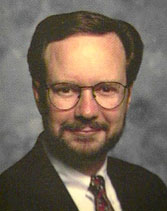
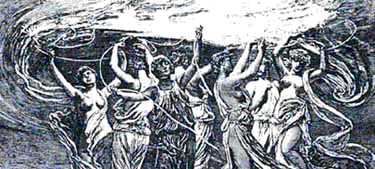
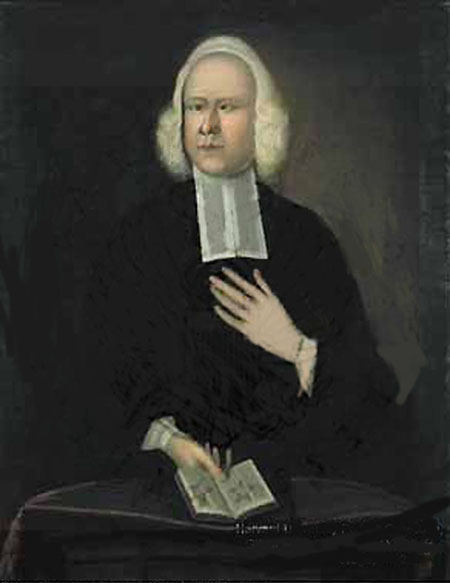 Reincarnation?
Reincarnation?
